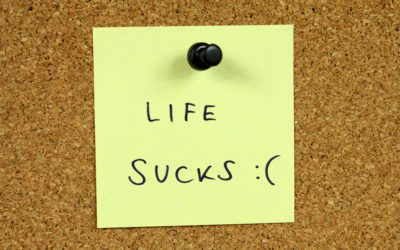I have written over a thousand blogs and written and/or contributed to over a dozen bestselling books over the past 20 years. And until a few years ago, there were two things I could absolutely guarantee would be part of my process.
First, I knew I would make my deadlines. While I often would cross the finish line with less than fifteen minutes to spare, the book or blog was always where it needed to be on or before the last possible minute to be ready for publication.
Second, I knew it would be stressful. Not continually and sometimes worse than at other times, but what seemed like the inevitable pressure of creating to a deadline created sufficient stress in my life and world that my wife would have to steel herself each time I accepted a new contract, knowing that when push came to shove she could kick me out of the house so I could go through the worst of it in a hotel instead of lying next to her in bed.
(The most extreme example of this came, ironically, when I was working as the developmental editor on a book about how to control stress. I took on the assignment with only six weeks to get the book from a puddle of possibilities to something tangible, coherent, and helpful; by the time we finished I wanted to take not only my own life but the lives of most of the people around me.)
But as I saw more and more about the thought-created nature of our experience, I saw that neither the pressure nor the stress that I experienced was coming from the deadline or the task at hand.
As with every experience we have, 100% of the feeling was coming 100% from thought.Click To TweetGradually, each new book felt a little bit less stressful and each deadline came with a little bit less of a sense of pressure.
Until…
Two years ago, I began working on the manuscript for Creating the Impossible. I had run the online version of the program for close to a decade, so I felt confident that this would be a relatively easy book to write. For the first time in memory, I didn’t freak out as the deadline approached, recognizing that my fears were made of scary thoughts and my track record spoke for itself.
And then, for the first time ever, I missed a publication deadline. Hay House very kindly moved the release of the book back by a couple of months to give me more than enough time to finish. And then I missed the second deadline. I felt oddly liberated, finally understanding the words of Douglas Adams, author of The Hitchhiker’s Guide to the Galaxy series, who said “I love deadlines. I love the whooshing sound they make as they go by.”
It was around that time that my agent phoned me to check in on how it was all going.
“Great”, I replied. “I’ve never felt so chilled and at peace around missing a deadline.”
“That’s wonderful”, he said with quiet humor in his voice. “How’s the book coming?”
And that was the moment where I fell down the staircase of insight and bumped my head on a deeper truth.
Our common cultural mythology around performance is that what we do or don’t do is a huge determinant of how we feel, and how we feel in turn determines what we do. We feel pressure, stress, guilt, and shame when we’re not doing what we think we should, and we attempt to use those feelings to compel ourselves into action.
But what I saw as clear as day was that what we do and how we feel are two completely independent variables. I’d had plenty of experiences of feeling stressed out and taking action; I now had an experience of not feeling stressed out and not taking action. But that didn’t mean that the two things had a cause-effect relationship.
I recognized that there had been any number of times where I felt great and got a ton done, and an equal number of times where I’d felt stressed and pressured and gotten a ton done. And while in this instance my inactivity coincided with a feeling of ease and comfort, I had no shortage of examples of inactivity accompanied by feelings of discomfort.
Suddenly, I realized a screamingly obvious truth:
If I do what there is to do, things get done; if I don’t, they usually don’t.Click To TweetAt some level, I already knew this. For over twenty years, my go to move as a coach when a client complained about putting off a task as a symptom of procrastination was to ignore their complaint and tell them to call me back when the task was done. Inevitably, things that had previously seemed impossible for them to get themselves to do, like paying bills, having a difficult conversation, or getting started on a big project, found themselves getting done without anything having to change in my client’s psychology,
But because I hadn’t seen the principles behind it, I thought of it as a cool trick – a way of getting people into action when it worked and annoying the heck out of them when it didn’t.
I could now see a deeper truth:
What gets done has everything to do with what we do and almost nothing to do with how we feel.Click To TweetSo while conversations about the Three Principles and the inside-out understanding can really wake us up to a deeper place inside us where everything is already OK and our innate well-being rises to the surface, in and of itself that won’t get the job done. Whether our job is writing a book, hitting a golf ball, building a house, or building a business, our results will be largely a function of the writing, hitting, and building that we do regardless of how we happen to be feeling while we do it.
Don’t get me wrong. I love that the more clearly I see the thought/feeling connection the more time I spend in well-being, and that the more I recognize and rest in my true nature as pure consciousness the more peaceful and even joyful I get to feel.
But I also love that when it comes to getting things done in the world, I can do what there is to do regardless of how enlightened I happen to be feeling from day to day.
Have fun, learn heaps, and here’s a question for you.
How’s the book coming? ☺
With all my love,![]()










